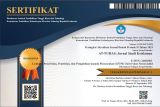Resistance of the Al-Qurṭubī to the Interpretation of Jannah in Qs. Al-Baqarah: 35 as a Place on Earth
(1) * Ibnur Rijal Athi'ullah
 (UIN Maulana Malik Ibrahim)
(UIN Maulana Malik Ibrahim) Indonesia
(2) Luthfi Karimatun Nisa' (UIN Maulana Malik Ibrahim)
Indonesia
(3) Ahmad Hidhir Adib (UIN Maulana Malik Ibrahim)
Indonesia
(*) Corresponding Author
AbstractThe Qur'an, as the word of Allah SWT, establishes many dictions when visualizing heaven, one of which is Jannah. Jannah is also one of the dictions that Rasulullah SAW chose when explaining to his friends about heaven. However, the term jannah in the Koran does not always mean heaven, sometimes it means garden. Departing from these two meanings, the mufassir disagrees regarding the meaning of Jannah in the QS. al-Baqarah: 35. This verse tells the story of the Prophet Adam who lived in Jannah. In this case, al-Qurṭubī very harshly criticized those who said Jannah in the QS. al-Baqarah: 35 is not heaven. The argument is built on three reasons, namely that someone who enters heaven will not come out of it, Satan cannot enter heaven, and there is no taklīf in heaven. This research aims to determine al-Qurṭubī’s critical analysis of the interpretation of Jannah in the QS. al-Baqarah: 35. This type of research is qualitative with a critical discourse analysis approach which is enhanced by literature review. The result, firstly, according to al-Qurṭubī, Prophet Adam's stay in heaven was indeed temporary. His expulsion from heaven is a scenario that Allah SWT has prepared. Second, Satan's entry into heaven is not impossible. Third, the absence of taklīf applies when all the inhabitants of heaven have entered it as a reward for what they have done in the world.
|
Keywords
Resistance; Al-Qurṭubī; Interpretation of al-Baqarah: 35; Jannah.
Full Text: PDF
Refbacks
- There are currently no refbacks.
Copyright (c) 2023 Ibnur Rijal Athi'ullah, Luthfi Karimatun Nisa’, Ahmad Hidhir Adib
This journal is licensed under a
Creative Commons Attribution-ShareAlike 4.0 International License





.png)






